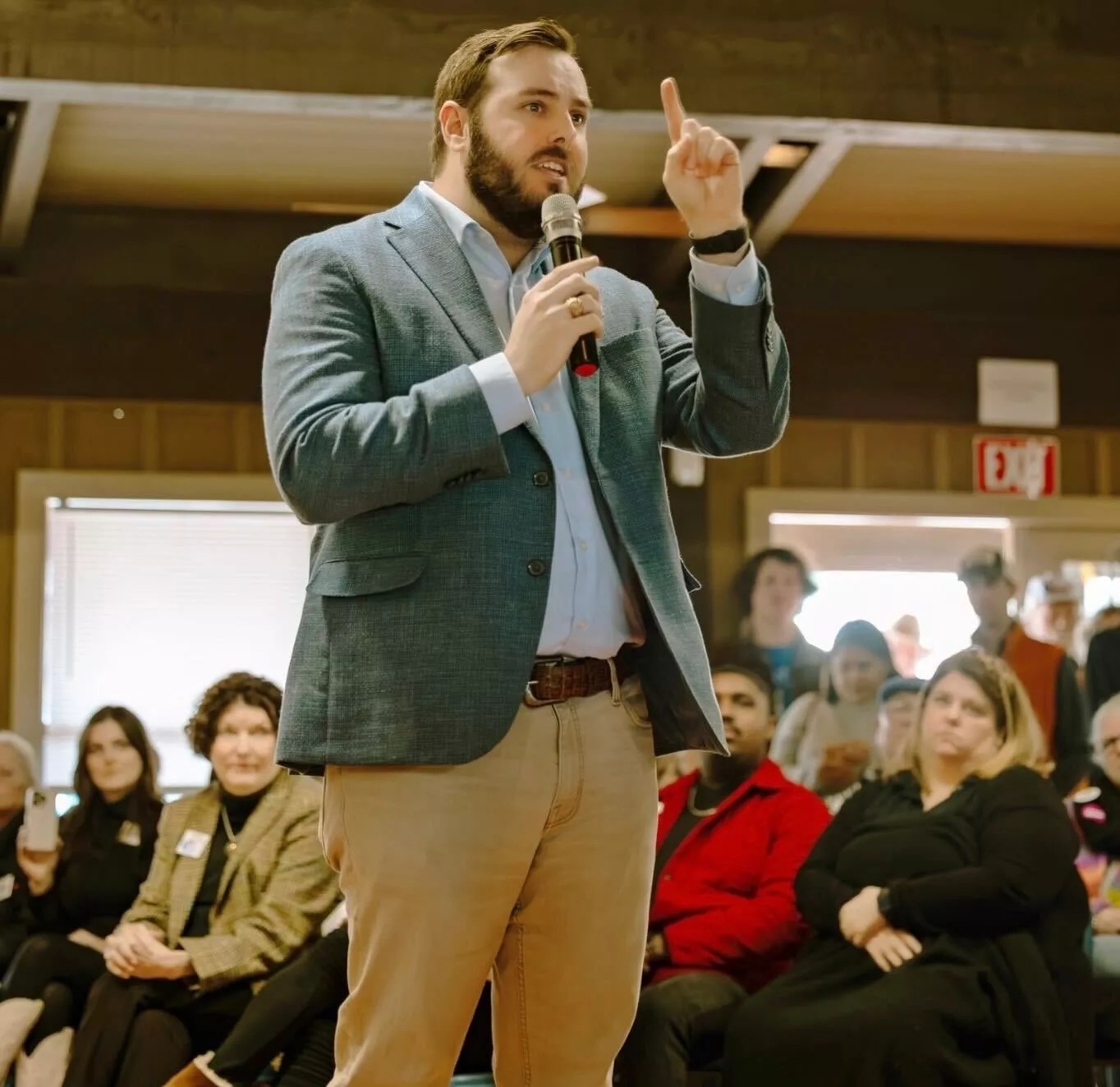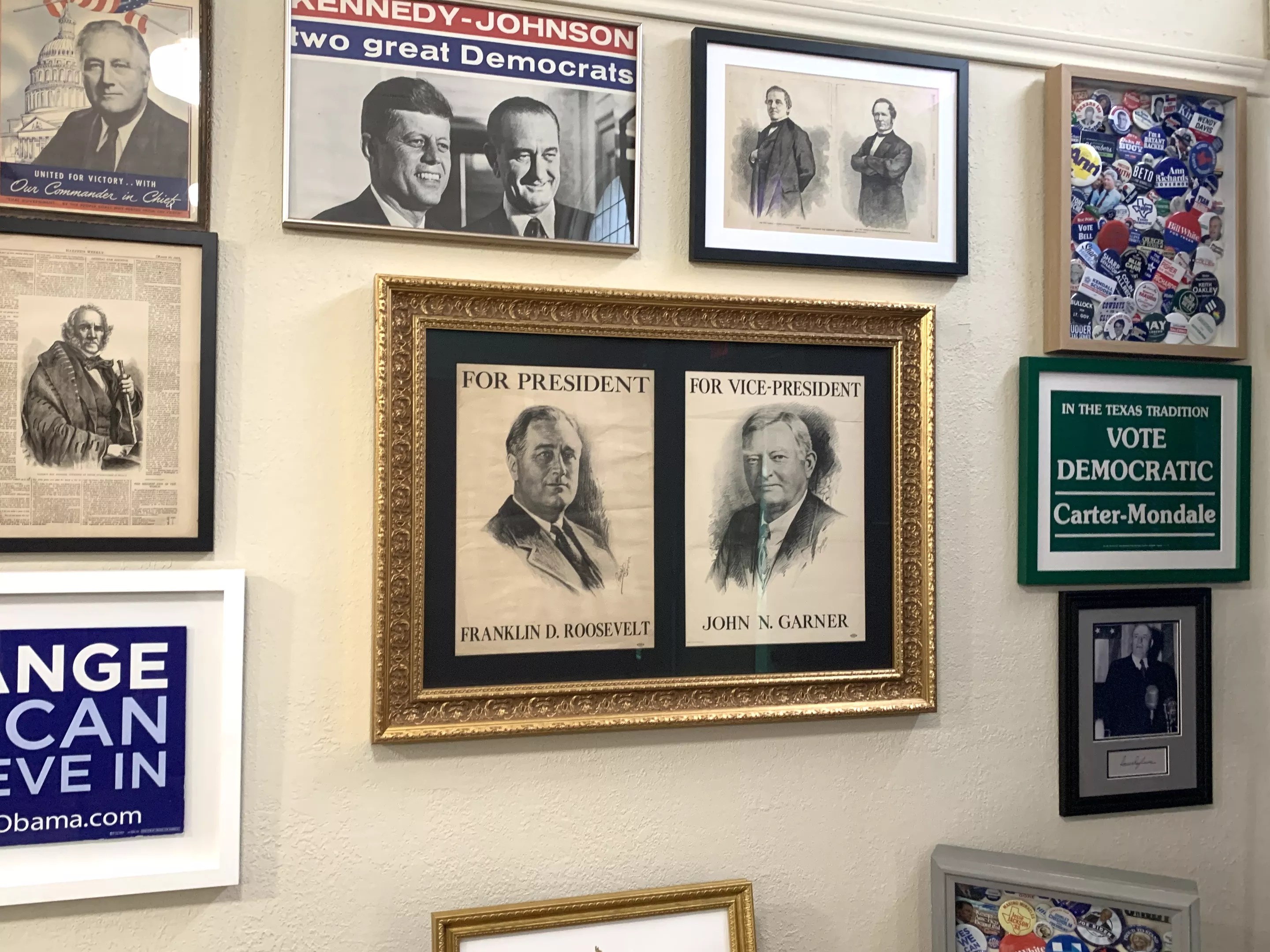
Hector Mendez

Audio By Carbonatix
Kendall Scudder was having a beer at Lakewood Landing on Nov. 7 when he heard that Gilberto Hinojosa, the longtime leader of the Texas Democratic Party, was stepping down. Scudder’s eyes grew to the “size of half dollars” as he looked across the table, where Rep. John Bryant was nursing his drink.
Forty-eight hours earlier, Texas Democrats had suffered blowout losses from the top of the ticket down, fueling frustration within the party and leading Hinojosa, who’d been the state party’s chair for 12 years, to resign. The decision was made official the day after Scudder found out, and in a statement, Hinojosa urged the state party to “embrace the next generation of leaders” moving forward.
“My political hero is state Rep. John Bryant, and he looked at me and he was like, ‘There’s just so much good you can do here,'” Scudder told the Observer last week. “We kind of looked at each other that night, and we were like, is this about to happen?”
On March 29, six months after that night at Lakewood Landing, Scudder was elected chair of the Texas Democratic Party. His win was decisive, taking 65 out of 121 votes in the seven-way race.
In his mind, it’s a new dawn for the state party that has underperformed for too long. He’s a “progressive millennial” whose obsession with Democrats – their policies and their history – is hard to rival. His office, headquartered enviably close to Jimmy’s Food Store in one of East Dallas’ many quaint, historic storefronts, is covered from wall to wall in the memorabilia of prominent Democrats past.
An oversized gouache-painted portrait of Ann Richards smoking a cigarette has a spot of honor across from the office’s front door. There are two original portraits of William Jennings Bryan, the “inherent populist” who was the Democrat’s presidential nominee in 1896, 1900, and 1908. Displayed side by side in a “real gaudy, beautiful” gold frame are matching portraits of Franklin Roosevelt and his Vice President John Nance Garner.
Elon Musk won't lose sleep if you can't pay rent.
Donald Trump and the GOP don't care if you can't afford groceries.
Take it from @KendallScudder: Democrats do, and we need to start acting like it. pic.twitter.com/8VHyAABj0i
— Texas Democrats (@texasdemocrats) April 2, 2025
Scudder has been collecting the posters for years, and until now, they’d been shoved under his bed or into desk drawers, accumulating dust.
“Estes Kefauver was the vice presidential nominee under Adlai Stevenson, and he was the only Democratic senator from the South who supported anti-lynching,” Scudder says, pointing to one of the frames at the display’s center. “They kicked him out of the Southern caucus for it. And so, for him, he’s the center of the wall. Because he’s a reminder every day that courage of convictions is what’s most important.”
‘I’m Mr. Democrat’
At his core, Scudder brands himself as a public school advocate, something he thinks aided him electorally in his chair campaign. Looking at the ongoing Texas Legislative session, Scudder doesn’t think it’s a foregone conclusion that Republicans will be able to successfully dismantle public education this year.
Texas Gov. Greg Abbott’s priority voucher bill, which will use public tax dollars to fund private school tuition for some students, advanced out of a House committee last week and is now set to be voted on by the full House floor. If the bill passes, it would be the first voucher bill to pass through the body successfully, but Scudder believes Democrats still have time to fight the policy that he describes as “welfare for the well-off.”
“Seventy days is a long time in the Legislature,” he said.
It’s key for Democrats to continue hammering on evidence from other states that show vouchers are an expensive and ineffective tool for managing education, he said. Arkansas adopted vouchers in 2023, but data from the 2024-2025 school year showed that 82% of the stipends disbursed were used to supplement the tuition of students already enrolled in private schools. Only 5% of Arkansas voucher recipients moved from a public school to a private school, the ideal that school choice proponents tout as the most significant benefit of a voucher system.
Texas school advocates have warned that vouchers will pull needed funding and resources from public schools, something Democrats “can’t stand for.” Scudder believes the party needs to spend the next few months of the session relentlessly emphasizing the relationship between a sound public school system and upward economic mobility, a relationship he feels he embodies.

Scudder’s office displays his collection of Democratic memorabilia.
Emma Ruby
Scudder grew up in New Boston, Texas, a town so small that Texarkana is the nearest major reference point. His family was more focused on farming purple hull peas than politics, but Scudder was drawn into the fray in the early 2000s when Republicans began a campaign that labeled LGBTQ+ individuals as unfit to be parents.
“As somebody that had lesbian moms, that was a problem,” he says, so he started knocking on doors to encourage community dissent.
He was around 12 years old, the age “you start to kind of realize what’s going on.” But without public schools, that kid probably wouldn’t have made it off the farm, much less “become the chairman of the Texas Democratic Party.”
“I worked at a Dairy Queen when I was in high school, and I waited tables to put myself through college. I was the first one to do it. It has a big impact on your life and the way you view the world,” Scudder said. “And so everything that we do, I think, how does this impact that little boy in East Texas with farm calloused hands? And how do we make sure that we’re setting him up to be able to have an opportunity?”
A pervasive messaging problem
At some point, it can be argued, Democrats stopped thinking about new ways to reach voters. In 2008, Barack Obama’s campaign for President “changed the way” politicians viewed social media. Democrats were the Facebook party, adopting the platform early on to reach new American masses.
Seventeen years later, though, Democrats are still the Facebook party.
On the other hand, Republicans, especially representatives of the party’s most conservative wing, have taken to dominating podcasting and social media. During the 2024 campaign, President Donald Trump spent two and a half hours on The Joe Rogan Experience, a podcast that isn’t inherently political but is one of the most listened to in the world. On YouTube alone, the interview has 57 million views.
“Democrats have traditionally been afraid to go places that aren’t safe. They’ve been a safe party where they’re trying not to offend, and they’re trying not to step out of bounds. You will not see that with me as chair. I’m not afraid of Fox News. I’m not afraid of conservative radio. I’m not afraid to go on Joe Rogan,” Scudder said. “We have to start meeting people where they are and bringing our message to people who haven’t had an opportunity to hear it.”
In some cases, he thinks that combatting the increasingly conservative online sphere may be as simple as looking to the parts of the state where Democrats are flailing and, “for the cost of a microphone,” propping up a Democratic influencer for that area. Scudder is practicing what he preaches, too.
While he no longer records episodes of his show Pod Bless Texas, a Texas-centric progressive podcast that Scudder started after mounting an unsuccessful challenge against Texas Sen. Bob Hall, half of his office space is dedicated to podcasting equipment. The day we sat down with him, our interview was squished between appearances on two shows.
He said the days of writing a press release, popping onto MSNBC, and calling it a day are over.
The Texas Democratic Party will also be reevaluating its central message. Until now, he feels Democrats have relied on policies that make a lot of sense if you give them 10 minutes to explain them. But who really has 10 minutes to sit through a lecture on the efficacy of vaccines?
“Everything that we do, I think, how does this impact that little boy in East Texas with farm calloused hands? And how do we make sure that we’re setting him up to be able to have an opportunity?” – Kendall Scudder, Chairman of the Texas Democratic Party
“What we need to be doing is speaking to what people feel. And we can get into public policy, I’m not saying to stop being academics. I’m not saying that we should stop caring about making sure that policy is good,” Scudder said. “What I’m saying is that you don’t lead with being the smartest person in the room when you walk in the door.”
Looking ahead to the 2026 election, Scudder wants to instill the message that voting for Texas Democrats means voting to keep taxes low “for working folks,” voting for the best-funded schools possible and voting for public safety. The latter is an issue Scudder doesn’t understand why Democrats have walked away from. He believes that Abbott and other bigwig Republicans should be raked over the coals for failing to pass firearm legislation that would keep guns out of the hands of Mexican cartels.
Democrats are traveling a rocky road going into the next election. Texas saw a significant dropoff in voter turnout for the 2024 presidential election compared to 2020, and a vast majority of that dropoff – about 1.1 million people, Scudder estimates – were Democratic voters who said the party “wasn’t worth their time.”
Not only is Scudder charged with bringing those voters back into the fold, but the party is also hoping to re-carve inroads with Latino voters in South Texas who turned to the Republican side of the ticket in historic margins in November. Republicans have made a 27-point swing with Texas’ Latino voters in the last decade, a shift primarily fueled by trust in the Republican party’s handling of the economy and the border, data from the Texas Politics Project shows.
Scudder thinks it was a mistake that Democrats didn’t talk enough about the economy in 2024, but it’s a mistake the party won’t be making again. As middle-class Texans start to feel the ramifications of Trump’s reciprocal tariff policy, Scudder wants Democrats to be ready to welcome the disgruntled to their table.
“Insurance rates are through the roof. Your rent is constantly going up, which you have to pay because you can’t afford to buy a home because interest rates are through the roof. The economy is not working for us,” Scudder said. “So life is not going to get easier for you, it’s about to get harder. And if [Democrats] aren’t standing on the front lines of that and showing that that matters to us and that we care about it, then why would [voters] trust us?”